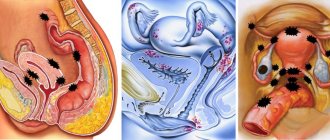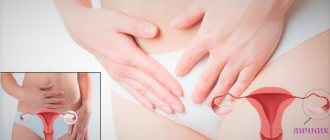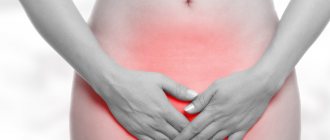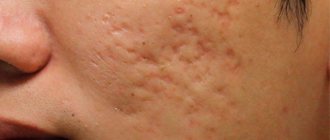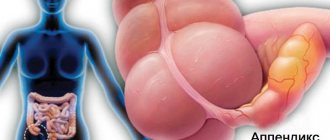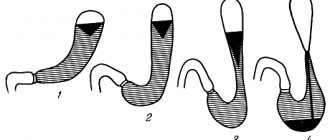The amount of hormones and their correct interaction significantly affect a woman’s health. Hormonal imbalance is a phenomenon characterized by insufficient production of female sex hormones.
Such a violation can lead to the development of various diseases of the female reproductive system, and, along with disruptions in the functioning of the immune system, inflammatory processes and genital infections, provoke many serious conditions:
- disrupted menstrual cycle;
- formation of polyps;
- polycystic disease;
- uterine fibroids;
- hyperplasia.
To avoid this, it is extremely important to undergo regular examinations with a gynecologist, since many pathologies of the reproductive system develop without any clinical manifestations - pain, bleeding and other symptoms.
In this article, we will understand the causes of hormonal imbalance in women, consider the main symptoms that cannot be ignored, as well as effective methods of treating this phenomenon.
how to restore hormonal levels using folk remedies
Causes of hormonal imbalance
There are many provoking factors that can cause a woman’s sex hormone levels to change. First of all, this is explained by the relationship of hormonal levels with the functioning of the neuroendocrine regulation of the central nervous system located in the brain, as well as with the proper functioning of the endocrine system.
Considering this point, the reasons that can cause changes in hormonal levels are classified as follows:
- Causes that arose as a result of disturbances in the functioning of central regulation.
- Causes that are provoked by pathologies of the endocrine system. Disturbances in its activity are caused by the appearance of various neoplasms, infectious diseases, inflammation and other conditions.
So, the following causes of hormonal imbalance can be identified:
- Genetics. Congenital abnormalities of the hormonal system are a rather complex problem that is difficult to correct. Typically, the main reason for concern is primary amenorrhea (a phenomenon in which girls over 16 years of age completely lack menstruation).
- Endocrine diseases (disturbances in the functioning of the adrenal glands, thyroid gland, pancreas).
- Taking oral contraceptives. Such drugs contain hormones, for this reason a disorder occurs, which manifests itself in the early stages in excess body weight.
- Colds, acute rotavirus and respiratory diseases. It has been proven that such diseases, if they occur very often, can lead to problems with hormonal levels.
- Poor nutrition. If a woman goes on strict diets and practices strict abstinence from food, the body begins to suffer from a lack of necessary elements, thanks to which certain hormones are produced.
- Various diseases, including asthma, uterine fibroids, migraines, polycystic ovary syndrome.
- A surgical intervention during which the internal female genital organs are treated.
- Nervous stress, neuroses, stress and depression - all this has a negative impact on the level of hormones in a woman’s body.
- Overweight. Having a large number of extra pounds increases the risk of developing hormonal imbalance in a woman.
In addition to the factors listed above, imbalances in hormone levels can be caused by physiological conditions such as:
- puberty, bearing a child;
- childbirth;
- lactation;
- menopause
But in most cases, the body restores normal hormone levels on its own.
increased tearfulness in women: causes and treatment
What hormones should you take during menopause?
Hormone therapy (HRT) is selected based on the intensity of fluctuations in female hormones during menopause. The age and physical condition of the patient also play a big role when choosing medications. Hormonal pills for menopause are indicated for women suffering from severe symptoms. Hormones during menopause are selected by the doctor for each patient individually.
Phytoestrogens
Menopause is followed by a sharp decrease in estrogen concentration, leading to the accumulation of harmful cholesterol in blood vessels, weakened immunity, and deterioration of lipid metabolism. To reduce the risk of age-related pathologies, doctors advise patients to take plant hormones during menopause. Phytoestrogens do not affect hormonal levels during menopause, but reduce symptoms. Treatment of menopause is carried out mainly with the following drugs.
- Klimadinon. A preparation based on black cohosh root extract. Reduces the manifestations of hot flashes, eliminates estrogen deficiency.
- Femicaps. A complex product including extracts of vitex and passionflower, evening primrose oil, vitamins E and B6, magnesium, lecithin. Normalizes estrogen balance, restores mental state.
- Remens. A complex homeopathic preparation based on extracts of cohosh, sanguinaria and pilocarpus, secretory secretions of cuttlefish, substances from the venom of the surukuku snake. Strengthens the body, eliminates estrogen deficiency, reduces the likelihood of mental, nervous, metabolic, vegetative disorders during menopause, extinguishes inflammatory reactions in the endometrium and uterine appendages.
Bioidentical hormones
During menopause, female hormones are replenished by taking bioidentical hormonal medications. These products must be used for up to 5 years, until the symptoms of menopause disappear. The most effective and affordable drugs are listed below.
- Duphaston. Substitute for natural progesterone. It prevents estrogens from negatively affecting the endometrium and reduces the likelihood of malignant tumors of the reproductive organs after menopause.
- Femoston. A complex drug including estradiol and dydrogesterone. Eliminates mental and vegetative manifestations of menopause, helps reduce blood cholesterol levels.
- Janine. A complex contraceptive drug based on dienogest and ethinyl estradiol. Intended to suppress ovulation, but during menopause it eliminates estrogen deficiency.
Preparations with estrogen
Medicines containing only estrogens help normalize menopause. The hormones contained in these drugs restore the functioning of the nervous system and stimulate collagen synthesis. The best medications are listed below.
- Klimonorm. A drug to eliminate estrogen deficiency. Normalizes the condition of the mucous membranes of the genitourinary organs, reduces the likelihood of developing pathologies of the heart and blood vessels.
- Premarin. Relieves the symptoms of menopause and prevents osteoporosis.
- Ovestin. Normalizes the condition of the vaginal walls, prevents inflammatory diseases of the genitourinary organs.
https://youtu.be/6QIFW7kL1qg
Symptoms of hormonal imbalance
What the clinical manifestations of hormonal imbalance will be has a direct connection with the woman’s age and physiological state. For example, while girls in adolescence experience a slowdown in the development of secondary sexual characteristics, in mature women the main manifestations are focused on menstruation and the ability to conceive a child. This means that the signs of hormonal imbalance are different, but the most pronounced symptoms that directly indicate the presence of such a problem are the following:
- Unstable menstrual cycle.
Constant delays, or absence of critical days for some time. - Increased body weight.
There is a sharp gain of extra pounds, fat deposits quickly form, and this process is not influenced by nutrition. Even if a woman exhausts herself with strict diets and limits herself in food, she still gets fat due to hormonal disorders. - Decreased sexual desire.
It happens that with problems with hormones, a woman loses interest in sex and her libido decreases. - Frequently changing mood, irritation, nervousness.
The woman constantly experiences mood swings, but for the most part, her mood is almost always bad. Anger, aggressiveness towards others, a pessimistic attitude, frequent depressive states appear - all of this often manifests itself as a change in hormone levels. - Hair loss.
Often one of the signs of changes in hormone levels in women is hair loss of varying degrees of intensity. - Sleep disturbances, fatigue, weakness.
The woman begins to have trouble sleeping at night and suffers from constant fatigue and drowsiness. Even good rest does not improve the condition.
Other symptoms are also characteristic of hormonal imbalances, but they are mostly of an individual nature. Such clinical manifestations include the formation of wrinkles, the appearance of cysts in the mammary glands, vaginal dryness, etc.
Therapy for such a phenomenon will be selected depending on the results of diagnostic measures. As a rule, to eliminate the symptoms of hormonal imbalance, the patient is prescribed medications that contain the same hormones, whose production in the female body is insufficient or completely absent.
first signs of menopause in women
A woman's body's response to changes in estrogen levels
As has already become clear, female sex hormones are responsible not only for the state of the reproductive system. Fluctuations in hormonal levels affect almost all organs and their systems. Lack of estrogen in women during menopause causes the following symptoms:
- Parts of the brain such as the pituitary gland and hypothalamus now begin to work differently without the participation of estrogen. Namely, they cause hot flashes to the upper body, which are accompanied not only by simply feeling unwell, but also by nausea, heavy sweating, dizziness, and pressure surges during menopause.
- As estrogen levels decrease, bones begin to break much more easily and teeth deteriorate.
- The thyroid gland stops working correctly. When estrogen decreases, it begins to secrete a lot of another hormone - thyroxine, which, in turn, provokes heart problems and makes it beat faster. Against the background of this condition, a woman develops a feeling of increased anxiety about her health.
- Since estrogen is secreted by the adrenal cortex, malfunctions of this organ occur, as evidenced by increased blood pressure and severe pain.
- During menopause, a woman becomes very familiar with the emotions of anger, irritability and resentment. The most unpleasant thing is that they are unstable, and the emotional background is constantly changing.
- The hormone estrogen significantly affects the level of carbohydrate metabolism, which is why women so often gain weight during menopause. Sometimes such disorders become very serious and lead to diabetes, and estrogen deficiency is also to blame for this.
The body is a whole system, the slightest malfunction of which leads to diseases. High levels of estrogen in the body are also dangerous, for example because it causes the uterine epithelium to thicken much faster, which can lead to cancer.
Symptoms of hormonal imbalance during menopause and menopause
- Depressive state, apathy for a long time, weakened concentration.
- Sleep disturbances (as a rule, during this period, a woman wakes up around five in the morning - at this time the production of hormones decreases).
- Signs characteristic of premenstrual syndrome. Basically, when menopause occurs, a few days before the start of menstruation, a woman experiences pain in the chest, an exacerbation of diseases of the digestive system, and severe migraines occur.
Types of menopause and their effect on the female body
Menopause is caused by natural processes and artificial intervention.
There are 3 types of menopause: early, timely, late.
Early menopause is considered to be the occurrence of hormonal changes in women after 35 to 44 years of age. Causes:
| autoimmune endocrine diseases; |
| consequences of oophorectomy; |
| after prolonged or severe stress; |
| Shereshevsky-Turner syndrome; |
| chemotherapy; |
| long-term smoking. |
Early menopause makes pregnancy impossible and increases the risk of diseases of the cardiovascular system, bones, and endocrine system.
Timely menopause occurs in the range from 45 to 54 years. The natural course of menopause allows a woman to go through this difficult period with the least discomfort.
The appearance of symptoms after 55 years is regarded as late menopause. The reason for this phenomenon may be:
| heredity; |
| taking certain medications; |
| tumors of the female genital area. |
With a late onset of menopause, a woman remains youthful longer than her peers, and the likelihood of becoming pregnant remains, which requires careful protection if having children is no longer part of the plans.
Possible consequences
Hormonal imbalances cause disruptions in the functioning of the entire body, so it is necessary to promptly identify the cause that provoked this phenomenon in order to prevent the risk of serious complications, which include the following:
- inability to conceive a child;
- obesity;
- skeletal disease with decreased bone density (osteoporosis);
- gynecological diseases of various nature;
- dysfunction of the reproductive system;
- the appearance of benign and malignant neoplasms;
- high risk of heart attack and stroke.
It should be taken into account that disruption of the functioning of internal organs, as well as most pathologies that are caused by hormonal imbalance, are difficult to correct. However, if you identify the cause, you can understand how to deal with the problem and, accordingly, quickly normalize hormone levels.
signs of thyroid disease in women
Treatment methods
Therapy for this disorder is prescribed after an examination has been completed, taking into account the detected causes that provoked the hormonal imbalance. Treatment measures should be aimed primarily at eliminating these causes.
Drug therapy
If the problem is accompanied by instability of the menstrual cycle, the woman may be prescribed the following medications:
- Hormonal agents, the action of which is aimed at restoring hormone levels. Since all such drugs have many side effects, and they must be taken over a long period of time, you should never select a medication on your own. The doctor is obliged, when prescribing a remedy, to determine the possible risk of negative phenomena in each specific situation. Single-phase or biphasic oral contraceptives are usually prescribed.
- Vitamin complexes, which must include calcium, vitamins E and A. These elements help improve the condition of hair and nail plates, normalize the amount of estrogen and progesterone.
- Drugs that regulate the menstrual cycle (Cyclodinone, Mastodinone).
- Medicines that will relieve the unpleasant symptoms characteristic of menopause (Klimadinon).
Surgical intervention
Operations are performed only if indicated in situations where the use of medications has not been effective.
Folk remedies
Many people prefer to carry out treatment using traditional medicine recipes instead of visiting a doctor. It should be understood that such measures are allowed only as an addition to the main treatment prescribed by the doctor.
Medicinal plants can be used to eliminate specific signs of hormonal imbalance and can be used for a short time.
Effective remedies for hormonal imbalance in women:
- Black cumin oil.
Helps normalize hormone levels and is successfully used in the treatment of infertility in both women and men. The product should be taken with a dessert spoon. Before meals - to enhance the therapeutic effect, after meals - should be used by women who have difficulty digesting oil on an empty stomach. The oil can be combined with taking hormone-containing medications. But it is important not to take them at the same time. The interval between doses should be at least three hours. - Sage.
Helps in the treatment of hormonal imbalance due to a lack of estrogen hormones due to the high amount of plant hormones that have an estrogen-like effect contained in the product. This plant is widely used to eliminate many problems that are associated with a lack of hormones - the inability to conceive and bear a child, lack of ovulation, endometrial diseases. An infusion of sage, which is used for these purposes, is prepared as follows: chop the dried leaves, 1 tsp. pour boiling water over the raw materials and leave in a warm place for 15 minutes, strain through cheesecloth. Use the product before meals, 50 ml 3 times a day. There is no need to drink at night. - Flaxseeds.
They represent a record holder among folk remedies for the content of plant estrogens. The plant contains much more of these elements than soy, which is usually used to correct hormone levels. Flaxseed oil and seeds contain lignin, a natural hormone that has estrogen-like properties and has a positive effect on the woman’s body. You should consume 2 tbsp. flax seeds 2 times a day with a glass of water. After just a few days, the symptoms of hormonal imbalance will decrease, irritability and insomnia will disappear, and after 2 weeks of use the greatest results will be felt. - Beetroot juice.
Drinking juices brings a noticeable effect in normalizing hormone levels. This is due not only to the fact that juices from vegetables and fruits contain natural hormones, but also to the fact that they contain a large amount of vitamins, microelements and other useful substances. The greatest benefit in the treatment of hormonal imbalances comes from beet juice, but you need to drink it with caution, taking into account the fact that in unlimited quantities it can cause discomfort in the stomach, as well as fluctuations in blood pressure. It is necessary to introduce beet juice into the diet gradually. At first, you can drink a maximum of 250 ml of the drink per day. It is recommended to dilute it with water or carrot juice in a 1:1 ratio.
Read more about menopausal changes
Hormones
largely determine a woman’s sexual development. Breast growth and the correct formation of reproductive organs in youth depend on their sufficient quantity. This is primarily influenced by sex hormones. They also build cyclical changes in the reproductive system, which are manifested monthly by menstruation and its accompanying symptoms. The main role in this belongs to follicle-stimulating, luteinizing substances, estrogens and progesterone.
Hormonal changes during menopause are such that the amount of these components gradually decreases. The process begins at the age of 35, when the ovaries no longer have such a supply of germ cells as in earlier years. The activity of these organs slows down, which is accompanied by a decrease in estrogen production.
Hormones are closely related to each other; a deficiency of one substance entails a quantitative drop in another. Menstruation comes less and less often, and more often without the formation of an egg. Its absence provokes a decrease in progesterone, which is responsible for the size of the mucous membrane of the uterus. The endometrium gradually becomes thinner.
When estrogen levels reach critical values by the age of 45-55, other female hormones also decrease during menopause.
Menstruation no longer comes because there are no appropriate conditions for tissue renewal. Internal reproductive organs decrease in size. The ovaries in the last stage of menopause completely stop producing hormones.
Prevention
Preventive measures against hormonal imbalance include the following:
- maintaining a healthy lifestyle;
- giving up alcohol, cigarettes and other bad habits;
- balanced diet;
- complete rest;
- undergoing a gynecological examination at least once a year;
- paying close attention to your own well-being, controlling your menstrual cycle;
- avoiding stress.
If you follow all these recommendations, you may never know about problems such as hormonal imbalance and its consequences.
symptoms of magnesium deficiency in the body in women

